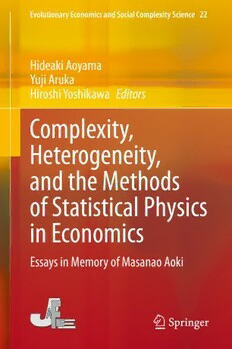
Complexity, Heterogeneity, and the Methods of Statistical Physics in Economics: Essays in Memory of Masanao Aoki PDF
Preview Complexity, Heterogeneity, and the Methods of Statistical Physics in Economics: Essays in Memory of Masanao Aoki
Evolutionary Economics and Social Complexity Science 22 Hideaki Aoyama Yuji Aruka Hiroshi Yoshikawa Editors Complexity, Heterogeneity, and the Methods of Statistical Physics in Economics Essays in Memory of Masanao Aoki Evolutionary Economics and Social Complexity Science Volume 22 Editors-in-Chief TakahiroFujimoto,Tokyo,Japan YujiAruka,Tokyo,Japan TheJapaneseAssociationforEvolutionaryEconomics(JAFEE)alwayshasadhered to its originalaim of taking an explicit“integrated” approach.This path has been followed steadfastly since the Association’s establishment in 1997 and, as well, since the inauguration of our international journal in 2004. We have deployed an agendaencompassingacontemporaryarrayofsubjectsincludingbutnotlimitedto: foundations of institutional and evolutionary economics, criticism of mainstream viewsinthesocialsciences,knowledgeandlearninginsocio-economiclife,devel- opmentand innovationof technologies,transformationof industrial organizations and economic systems, experimentalstudies in economics, agent-based modeling ofsocio-economicsystems,evolutionofthegovernancestructureoffirmsandother organizations,comparison of dynamically changing institutions of the world, and policy proposals in the transformational process of economic life. In short, our starting point is an “integrative science” of evolutionary and institutional views. Furthermore,wealwaysendeavortostayabreastofnewlyestablishedmethodssuch asagent-basedmodeling,socio/econo-physics,andnetworkanalysisaspartofour integrativelinks. More fundamentally,“evolution”in socialscience is interpretedas an essential key word, i.e., an integrative and /or communicative link to understand and re-domainvariousprecedingdichotomiesinthesciences:ontologicalorepistemo- logical,subjectiveorobjective,homogeneousorheterogeneous,naturalorartificial, selfishoraltruistic,individualisticorcollective,rationalorirrational,axiomaticor psychological-based,causalnexusorcyclicnetworked,optimaloradaptive,micro- or macroscopic,deterministicor stochastic, historicalor theoretical,mathematical orcomputational,experimentalor empirical,agent-basedorsocio/econo-physical, institutional or evolutionary, regional or global, and so on. The conventional meaningsadheringtovarioustraditionaldichotomiesmaybemoreorlessobsolete, tobereplacedwithmorecurrentonesvis-á-viscontemporaryacademictrends.Thus wearestronglyencouragedtointegratesomeoftheconventionaldichotomies. These attempts are not limited to the field of economic sciences, including management sciences, but also include social science in general. In that way, understanding the social profiles of complex science may then be within our reach.Inthemeantime,contemporarysocietyappearstobeevolvingintoa newly emerging phase, chiefly characterized by an information and communication technology (ICT) mode of production and a service network system replacing the earlier established factory system with a new one that is suited to actual observations. In the face of these changes we are urgently compelled to explore a set of new properties for a new socio/economic system by implementing new ideas. We thus are keen to look for “integratedprinciples” common to the above- mentioned dichotomies throughoutour serial compilation of publications. We are alsoencouragedtocreateanew,broaderspectrumforestablishingaspecificmethod positivelyintegratedinourownoriginalway. Editors-in-Chief TakahiroFujimoto,Tokyo,Japan YujiAruka,Tokyo,Japan EditorialBoard SatoshiSechiyama,Kyoto,Japan YoshinoriShiozawa,Osaka,Japan KiichiroYagi,Neyagawa,Osaka,Japan KazuoYoshida,Kyoto,Japan HideakiAoyama,Kyoto,Japan HiroshiDeguchi,Yokohama,Japan MakotoNishibe,Sapporo,Japan TakashiHashimoto,Nomi,Japan MasaakiYoshida,Kawasaki,Japan TamotsuOnozaki,Tokyo,Japan Shu-HengChen,Taipei,Taiwan DirkHelbing,Zurich,Switzerland Moreinformationaboutthisseriesathttp://www.springer.com/series/11930 Hideaki Aoyama (cid:129) Yuji Aruka (cid:129) Hiroshi Yoshikawa Editors Complexity, Heterogeneity, and the Methods of Statistical Physics in Economics Essays in Memory of Masanao Aoki Editors HideakiAoyama YujiAruka ResearchInstituteofEconomy,Tradeand InstituteofEconomicResearch Industry ChuoUniversity KyotoUniversity Hachioji-shi,Japan Kyoto,Japan HiroshiYoshikawa FacultyofEconomics RisshoUniversity Tokyo,Japan ISSN2198-4204 ISSN2198-4212 (electronic) EvolutionaryEconomicsandSocialComplexityScience ISBN978-981-15-4805-5 ISBN978-981-15-4806-2 (eBook) https://doi.org/10.1007/978-981-15-4806-2 ©SpringerNatureSingaporePteLtd.2020 Thisworkissubjecttocopyright.AllrightsarereservedbythePublisher,whetherthewholeorpartof thematerialisconcerned,specificallytherightsoftranslation,reprinting,reuseofillustrations,recitation, broadcasting,reproductiononmicrofilmsorinanyotherphysicalway,andtransmissionorinformation storageandretrieval,electronicadaptation,computersoftware,orbysimilarordissimilarmethodology nowknownorhereafterdeveloped. Theuseofgeneraldescriptivenames,registerednames,trademarks,servicemarks,etc.inthispublication doesnotimply,evenintheabsenceofaspecificstatement,thatsuchnamesareexemptfromtherelevant protectivelawsandregulationsandthereforefreeforgeneraluse. Thepublisher,theauthors,andtheeditorsaresafetoassumethattheadviceandinformationinthisbook arebelievedtobetrueandaccurateatthedateofpublication.Neitherthepublishernortheauthorsor theeditorsgiveawarranty,expressedorimplied,withrespecttothematerialcontainedhereinorforany errorsoromissionsthatmayhavebeenmade.Thepublisherremainsneutralwithregardtojurisdictional claimsinpublishedmapsandinstitutionalaffiliations. ThisSpringerimprintispublishedbytheregisteredcompanySpringerNatureSingaporePteLtd. The registered company address is: 152 Beach Road, #21-01/04 Gateway East, Singapore 189721, Singapore Foreword: Memories of Masanao Aoki Masanao and I were colleagues at UCLA for many years. When he decided to branch out from Engineering into Economics, he came to me for suggestions on whattoread.IrememberthatoneofmysuggestionswasSamuelson’sFoundations butMasanaofoundittrivialandnotatallhelpful.Fromthatunpromisingbeginning, wegraduallylearnedtocooperatemorefruitfully.Hebecameavaluedcolleague. California’sfinancialcrisisintheearly1990sledtheUniversityofCaliforniato offerearlyretirementtofullprofessorswhometasetofcriteria.MasanaoandIwere twooffourintheUCLAeconomicsdepartmentwhometthecriteria.Subsequently, MasanaotookapositionattheUniversityofTokyoandItookoneattheUniversity of Trento in Italy. In additionto my dutiesas professorof monetaryeconomics,I beganasummerschoolprograminAdaptiveEconomicDynamics.Masanaowasan invitedguestlectureratourthirdsummerschoolinJulyof2002. ThismayhavebeenthelasttimeIsawMasanaoandChiekotogether.Mywife andIinvitedthemtodinneratCastelToblino,asmallmedievalcastleonaprotected lake.As weentered,thehostesstoldusin Italianthata youngJapanesecookwas the sous-chef and was learning Italian cooking in the restaurant. It was a balmy eveningandweweregivenatableonabalconyoverlookingthelake.Attheendof thedinnertheJapanesecookcametopayhisrespects.Itwasamemorableevening forallofus. IwassorrytolearnofthepassingofMasanaobuthavemanygoodmemoriesof him. Trento,Italy AxelLeijonhufvud vii MasanaoAoki (5/14/1931–7/24/2018) Preface ProfessorMasanaoAokimadeoutstandingcontributionstoeconomics.Thoughhis works widely range firstly from the dual and adaptive theory of control and the applicationsin dynamicprograming,thecontroltheoryandparametersestimation of large-scaled and decentralized system, the applications of control theory and systemtheory,thedevelopmentofanewalgorithmforthetimeseriesmodelandits application,andfinallytothemostexcitingstagetoconstructanewperspectivefor economicscienceinlinewiththeSocietyforEconomicScienceforHeterogeneous Interacting Agents he co-founded in 2006, we would like to emphasize here that his contribution to macroeconomics based on statistical physics was truly pathbreaking. It provides a well-defined alternative to mainstream micro-founded macroeconomicsbasedon representativeeconomicagents.He wasa pioneer.The newapproachawaitsfurtherinvestigations. As Klaus Mainzer, philosopher of science at TU Munich, who is also from thefieldofphysics,suggested,AdolpheQuételet(1796–1874)andFrancisGalton (1822–1911)were the most influentialfigures in promotingthe enthusiasm in the law of large numbers and normal distributions as a universal rule in nature and society. Galton, a British medical doctor, was well known as the first person to measureintelligence,emphaticallystatedfromthelawoflargenumbers.Itistrivial to see that our traditional way of thinking was much influenced by their opinions astheuniversalmeasureatmanydifferentspheresofsocialstagesandjudgments. At the end of the last century,however,the end of this kind of traditionalthought began by the advent of econophysics and other related complexity studies. Due to the last 20 years’ studies in these fields, we have witnessed the universality of thesestudies.Toouropinion,thiscenturymustbecharacterizedbytheeraoftruly empirical science or data science. Among these new achievements, however, the worksofProfessorMasanaoAokimustbebyfarunique.Hehasgreatlycontributed toformulatesystematicallythetheoreticalfoundationsfornewsciencesthroughthe intensive worksat his final stage of life. In particular,he has smartly shown us to replacetheoldapproachwiththeoccupancyprobleminphysics. Inhiscontributions,wecanalwayslearntheusefulnessoftheclassicoccupancy problem in physics when we also apply it to social science. There are two kinds xi xii Preface inthisproblem:theMaxwell-BoltzmannandtheBose-Einsteinform.Thelatteris closely related to Professor Aoki, who is mainlyinterested in the case thatagents areexchangeableandtheirtypesarenotnecessarilyfixed.Thisformulationisquite naturalforusifwewanttodealwithanysocialevolutionandinnovation,because innovationwillalmostbringusnewunknownagents.Therearemanyofeconomists whodonotknowthatthetheoryofincreasingreturnandpathdependencybyBrian ArthurwasdrivenbytheuseofPolyaurntheory.Therearemanymoreeconomists whodonotknowthatBrianArthurgeneralizedPolya’soriginaltheoremtoafinite n balls in cooperation with Ukrainian mathematicians. Much more interestingly, there are extremely fewer economists who do know that Polya’s distribution will be potentially transformed to the Maxwell-Boltzmann distribution and the Bose- Einsteindistribution. On the other hand, as long as we are stationed at the two/alternative sector models, even the use of the generalized master equation or the state transition equation system based on new occupancy problem may not explicitly exert the usefulnessofthenewanalyticalmethods.Untiltheadventofthesystematicworks byProfessorAoki,wedidnotknowtherecouldbeanewinnovativewaytoanalyze theevolutionofsociety.Unfortunately,evennowmosteconomistsarenotfamiliar with the occupancy problem formulation at all. Economists must find a new way by tracing the new analytical development along new distributions like Ewens distributionwhilestartingfromthenegativebinomialdistribution. All the contributors to this volume respect Professor Aoki’s works and try to cultivate the new field in their own ways. We hope that more economists join the marchandthattheyfindthepapersputtogetherinthisvolumevaluable. Kyoto,Japan HideakiAoyama Hachioji-shi,Japan YujiAruka Tokyo,Japan HiroshiYoshikawa
